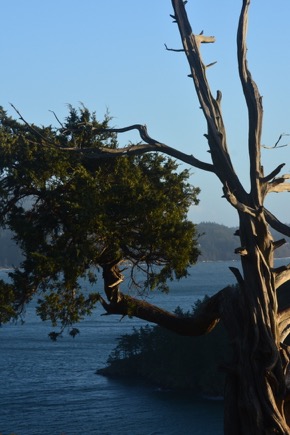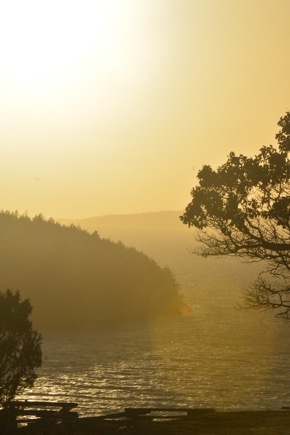Exploring the coast
01/12/20 01:40
Living near the ocean is something new in our lives. We’ve always lived hundreds of miles from the ocean and most of the time our home has been more than a thousand miles from the nearest ocean. We’ve visited the ocean plenty of times and enjoyed playing in the ocean, but we are pretty much landlubbers. We don’t know much about the weather of coastal places. But now we are close to the ocean, or at least the Salish Sea, also known as the Puget Sound. If you go straight west from our home here in Washington, you will eventually reach Victoria, the city on the southern end of Vancouver Island, which is part of British Columbia.
Yesterday we decided to go for a walk along the coast. 20 miles from our home we were on an island. Fidalgo Island is connected to the mainland by a bridge. It is also connected to Whidbey Island by another bridge. At Washington Park on the northwest corner of the island you can look to the north to see Cypress and Guemes Islands and west to see Blakely, Decatur and Lopez Islands across the Rosario Straight.

The part of the experience that I find hardest to describe is the way the air smelled and felt. I don’t know what the relative humidity was, but it must have been quite high. The wind was blowing mist from the ocean across the park. It smelled wonderful with the cedar trees dampened by the moist air. For folks who have lived most of our lives far away from the ocean it was a treat.
Actually, we are not unique in having moved close to the ocean. According to scienceblogs.com, 40 percent of the world’s people live within 37 miles of a coastline and 80 percent live within 62 miles of the coast. That’s roughly 2.4 billion people who live about as close to the ocean as we do.
Having moved from the Black Hills of South Dakota, however, we have a lot to learn about coastal living. As we drive around we see the signs for the tsunami evacuation routes. Our home here is above the 30 meter mark, which is considered to be safe high ground, but there are plenty of places that are lower. Our home is 187 feet, or 57 meters, above sea level, but downtown Mount Vernon is only 98 feet, or 30 meters. That means that in a worst case scenario, water surging up the Skagit River after a tsunami could reach downtown were it not for the protective flood walls that have been constructed. The flood walls are not tsunami preparations, however, but rather protection from flooding of the river caused by melting snow in the high country combined with heavy rains. We’ve hiked along the flood walls. They are impressive.
As we look for a home to buy, remembering the 30 meter rule will be important. Just as was the case when we bought our home in Rapid City, having witnessed the aftermath of the 1972 flash flood that devastated the city, we will be looking for a place on a hill just so we won’t worry about the water.

Water will be one of the themes of our retirement life. From our home here we have easy access to almost every kind of paddling from whitewater to flat lakes to big rivers to the ocean. There are a lot of boats around here. At the marinas on the island there are some truly impressive private yachts. I’ll be sticking to canoes and kayaks and an occasional row in my rowboat, but there are people who live aboard their boats in the harbors and boats that are in slips that function as vacation homes for their owners.
There is much for us to learn as we explore our new home, but exploring is part of the fun of this phase of our lives. As we walked together yesterday we talked about how each of us has benefitted from the other’s spirit of adventure. Going on adventures together has been something that we have enjoyed throughout our married life. We have a joke about our tendency to discover “long cuts” when we travel. Some people find short cuts, but we tend to find ourselves going the long way around. Finding ourselves in this new place is another of those long cuts.
I plan to return to the island one day when it is really stormy, just to see what the ocean looks like when things are wild. Weather here is very different from the other places we have lived, so it will be an adventure just to see what it is like.
So far there hasn’t been any snow to shovel. I think I was wise to sell my snowblower. We shall see.
